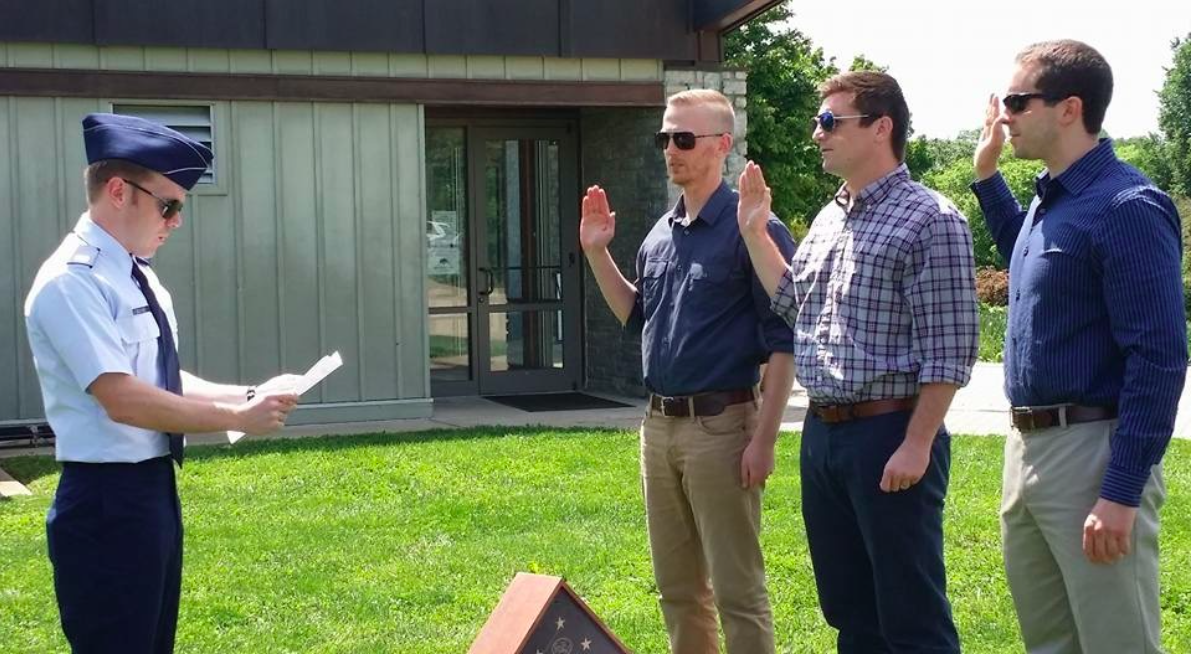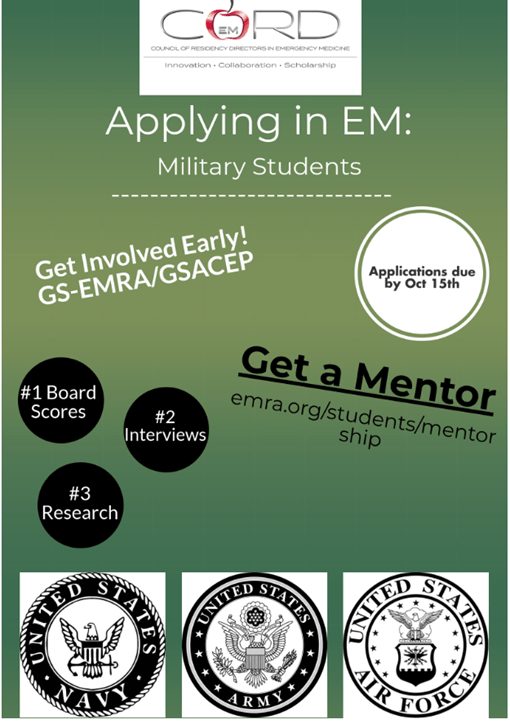Author: Dr. Sameer Desai, University of Kentucky, on behalf of the CORD Student Advising Task Force.

This post is the first in a series on Special Advising Circumstances. Each post will highlight the best advising information available for applicants in less common situations. The author would like to thank Dr. Linda Katirji, resident at the University of Kentucky, for her invaluable contribution to this resource.
Many students who seek financial assistance for medical costs and/or have an interest in the military and military medicine will join the Health Professional Scholarship Program (HPSP) or attend medical school at the Uniformed Services University of the Health Sciences. Although these students should still aim to be a strong applicant in all of the same ways as civilian students, the military match poses its own set of challenges that students should be aware of before they apply.
GENERAL OVERVIEW OF THE MILITARY SYSTEM
The military application timeline is much earlier than civilian so it is important to be aware of the timeline early in medical school. MSI and MSII years should be used to focus on doing well in classes, Step I and Step II. Basic officer training will be completed between first and second year. Applications are submitted in September of the 4th year of medical school and interviews are completed by November. Thus away rotations must be done before then to be helpful. It is the job of the Joint Service GME Selection board to rank and “match” everyone. They meet in late November / early December.
If you have a military obligation, you must apply to the military GME and the civilian match (ERAS). When you do this, there can be three different outcomes:
- A military residency is obtained
- A civilian residency is obtained, with military deferment
- A military transitional internship is obtained
If you are selected for a military residency, you will serve as an active-duty physician. Time in residency does not count towards any service commitment.
Since many military applicants will obtain military deferment and train in a civilian residency, it is important that you also apply through the civilian match and schedule an adequate number of interviews. All civilian residencies are aware of this issue, and understand that you will be withdrawn off their list if you match in the military. In a perfect world, you could do civilian interviews all after military match is completed, however it could be very difficult to schedule enough interviews in that short of a time. Because of the timeline of things, you will likely need to schedule the bulk of your civilian interviews in late December / January. If you are a student who is at risk of not matching in the military match, it may be prudent to take time off from your rotations in January to allow for an adequate number of civilian interviews. If you do train in a civilian residency, you will fulfill your military obligation after residency.
THE POINT SYSTEM
The military uses a structured point system to rank all applicants. When the Joint Service GME Selection board meets in December, each applicant is evaluated and given a point score based on success in medical school (class rank and USMLE / COMLEX scores), suitability (based on clerkships, interviews, LORs), prior military service, and research. Research is a key difference between civilian and military programs. In civilian programs, research is typically not emphasized as a must to apply to Emergency Medicine. However military programs typically place more weight on this, and give more points for peer reviewed and multiple publications. If an applicant has completed an internship year and/or an operational tour, that is included in their scoring as well. This means students graduating from medical school will be competing with interns and post-internship doctors for training slots. Every military applicant will be put in order based on his or her points. Based on the needs of each service, which may change every year, a cut off line is set. Each service will match the top candidates to their residency of choice.
Currently, military medical students who do not match in their chosen field may reapply the next year during their internship. Their applications often are scored in such a way that puts them at an advantage above the fourth year medical students applying that same year. This may change in the near future.
SUCCESS IN THE MILITARY MATCH
Emergency medicine is becoming more competitive across the board and even more so in the military. Success in the military match is largely based on the same things as the civilian match. Working hard in medical school and optimizing class rank and standardized testing scores is important, as is contributing to research and extracurricular activities. Although the point system is in place, there are subjective components (interviews and “suitability”). You should always work hard on your away rotations and make a good impression during interviews to gain. Much like the civilian match, if there is a particular place you hope to do your residency, you should try and schedule a 4th year clerkship there. All HPSP should perform a rotation at a military hospital. This gives the staff a chance to get to know the potential applicants. Knowledge and interest in the military and the customs / courtesies associated with it can go a long way as well, and letters of recommendation / support from military physicians may carry more “weight” than civilian.
WHAT IF I DON’T MATCH?
Unfortunately due the way the match is set up, this can be a reality for some people. However, if you do not match into a military OR civilian spot, there are still options.
- Switch into a military residency in another field if available
- Do a one year civilian or military internship (transitional PGY-1 year)
Afterwards you may do one of the following:
- Reapply to for residency (with the opportunity to obtain more points)
- Serve as a General Medical Officer (GMO)
GMOs (Flight Surgeons and Undersea Medical Officers) provide care to active-duty personnel and gain military-specific medical training. Time as a GMO fulfills active-duty service obligation and may make your application more competitive when you reapply to the residency of your choice.
The Government Services Chapter of ACEP (GSACEP) has a great resource page for those involved in the military match.
MILITARY EMERGENCY MEDICINE PROGRAMS
Air Force
San Antonio Uniformed Services Health Education Consortium (SAUSHEC) Emergency Medicine Residency Program
Brooke Army Medical Center, MCHE-EMR
3851 Roger Brooke Dr.Fort Sam Houston, TX 78234-6200
(210) 916-1006
Type of Program: PGY 1-3
Number of Residents: 16/year (8 Army, 8 Air Force)
Website
Wright State University (affiliated with Wright Patterson Medical Center)
Mike Ballester, M.D., Program Director
Department of Emergency Medicine
3525 Southern Blvd
Kettering, OH 45429
Telephone: (937) 395-8839
Fax: (937) 395-8387
E-mail: som_em@wright.edu
Website
Army
Carl R. Darnall Army Medical Center
Emergency Medicine Residency
Department of Emergency Medicine, Building 36009
36000 Darnall Loop
Fort Hood, Texas 76544
254-288-8303
254-288-8336 (Fax)
Type of Program: PGY 1-3
Number of Residents: 8/year
Madigan Army Medical Center
Emergency Medicine Residency
ATTN: MCHJ-EM, 9040 Jackson Avenue
Tacoma, Washington 98431
(253) 968-1250 or DSN: 782-1250
Type of Program: PGY 1-3 Number of Residents: 12/year
San Antonio Uniformed Services Health Education Consortium (SAUSHEC) Emergency Medicine Residency Program
Brooke Army Medical Center, MCHE-EMR
3851 Roger Brooke Dr.
Fort Sam Houston, TX 78234-6200
(210) 916-1006
Type of Program: PGY 1-3
Number of Residents: 16/year (8 Army, 8 Air Force)
Navy
Naval Medical Center San Diego
Department of Emergency Medicine
34800 Bob Wilson Drive
San Diego, CA 92134
619-532-8276
Type of Program: PGY 1-4
Number of Residents: 9/year
Website
Naval Medical Center Portsmouth
Department of Emergency Medicine
620 John Paul Jones Circle
Portsmouth, VA 23708
757-953-1365
Type of Program: PGY 1-4
Number of Residents:
Website
If you have any more information or questions about matching into military emergency medicine residency, leave them in the comments below!
Last updated Januaury 11, 2019


[…] the second post in a series on Special Advising Circumstances, following the previous post on the Military Match in Emergency Medicine. The purpose of this series is to disseminate the collective wisdom of EM clerkship and program […]
LikeLike
The Medical College of Georgia at Augusta University also has a military EM program. It is a civilian hospital but has active duty Army residents for approximately half of their slots.
LikeLike
Both the Navy programs are PGY1-4 programs, not PGY2-4 programs. Additionally, the Naval Medical Center Portsmouth link does not work. Try this one – https://emresportsmouth.org/information/
LikeLike